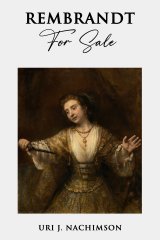Rembrandt for Sale
Towards the end of the eighteenth century, the concept of artistic genius was formulated and held up as the highest human species.
Genius in art requires breaking the rules or exceeding them in ways that make them unrecognizable. There is a saying that "any sufficiently advanced skill is indistinguishable from magic." So when the Master in Art Alan De Mayo revolutionized art with his "Renaissance paintings," the response - from all art critics was total astonishment, and important critics of art named him as Rembrandt's successor.
Genre: Drama
Genre: Drama
- Year:
- 2023
- 84 Views
Albino Castellani was born in Catanzaro, the capital of the Calabria region in southern Italy, to middle-class parents. His father, Pasquale, was a barber with a small shop in the suburbs, and his mother, Maria Grazia, was busy raising her six children. Pasquale was a semi-illiterate who had completed three years of elementary school and was obliged to work from the age of ten as a barbershop cleaner, where he also, over the years, learned the profession. But Maria Grazia was born into the privileged De Mayo family. One of her distant relatives was from the French Royal house of Bourbon (It was just a rumor that the family was spreading), and her father had a silk trading house. Maria Grazia was educated in a private school for girls and was the only child of her wealthy parents. In adulthood, she met Pasquale at an amusement fair in the city. Beautiful young girls always surrounded young Pasquale due to his incredible resemblance to film actor Vittorio Gassmann. She was standing near a stall selling cotton candy when he approached her and, with the charisma of a "Latin Lover," offered her some. Maria Grazia refused, but his generosity and beauty captured her heart, and she fell desperately in love with him. When she brought him home and introduced him to her parents, her father knew nothing about the guy standing before him and honored him with a glass of grappa. But, when he started questioning him, he nearly choked, and his face turned red from lack of air until a doctor was called to their home. Since that meeting, her father had forbidden her to see him. He was so shocked by the encounter that he threatened suicide if she saw him again. She spent many weeks crying and shutting herself in her room until she decided to give up her comfortable life and, at the first opportunity, ran away from home with her love to an apartment that Pasquale had prepared in advance. When the search for her came didn't have any results, and her father feared for her life, he arrived at Pasquale's parent’s house and told them that he agreed to their marriage, but on one condition; he demanded that after the wedding, the couple come to live in his house. When the two married, Maria Grazia was already at the beginning of her first pregnancy, and on the day Albino was born, her father hung himself in his study. Her mother died of grief a few months later, and Maria Grazia inherited the business and apartment they lived in. Pasquale tried to run the trading house, but he soon found himself in heavy debt because he could barely read, and they were forced to sell the business. Maria Grazia was already in her second pregnancy when Pasquale opened the barbershop with the bit of money they had left. Life did not smile on Albino. The situation at home was difficult, but his mother sent him to school every day to study. Albino excelled in his studies and even found time to help his father clean the store at the end of the workday. Pasquale was proud of his son, mainly because after Albino, five daughters were born one year apart. When Albino turned eighteen, he decided to leave Catanzaro and move to Milan in northern Italy. He applied and was accepted to the Academy of Fine Arts - Brera. Then, in early July of 1980, he packed his belongings in one suitcase and boarded a train headed north. During his first week in Milan, Albino lived in the room of his compatriot, who had returned home for the summer. It was an apartment shared by five students, two of whom studied and three worked. One arranged a temporary job for him the next day, washing dishes in a restaurant. After an evening of intense work in the restaurant's kitchen, he found a naked girl sleeping in his bed. He immediately understood what the apartment was used for and looked for another accommodation. He posted ads on supermarket billboards and, within days, had an independent studio apartment and a job as a cat handler. Cat owners who had to leave their cats for several days brought them to him for a handsome fee. When the number of cats reached twenty, he stopped getting new ones, the cats roamed every corner of the small apartment, but he preferred it over washing dishes. When the school year opened, he stood at the gates of the Brera Academy, radiating joy. Although he got bored and missed a few lectures in the first month of the semester, he would go around the various workshops and watch the advanced students and their artwork. Then, in one of the workshops, he met Anna. What is your name?" she asked him. "Alan," he answered. "Where are you from?" she asked him curiously. "From Rome," he answered her without hesitation. Anna Lombard was an English student who started her studies in London but quickly realized that returning to London with an academic degree from the Brera academy would give her a comparative advantage over other artists. "After all, Italy is the cradle of world culture and art," she explained to her new friend Alan. The two began visiting museums and art galleries in Milan, Florence, and Siena. For hours they sat in front of paintings in cathedrals, churches, and galleries. They looked, captivated, at oil paintings created by the great artists of the Renaissance and Baroque periods, the Rococo style, temporary art, or Impressionism. Anna helped Alan with the cats, but one day surprised him. "Let's fly to London to meet my parents; you'll see, they are nice people and will welcome you. We can also visit the British Museum and the National Gallery; I invited you and will pay for everything." Alan did not hesitate for a moment; he had never left the borders of Italy and certainly never flown in a plane. Moreover, he understood that her parents supported her financially and did not object to her paying for everything. Since he did not have a passport, he went to the Ministry of the Interior, changed his name officially from Albino to Alan on his ID card, and asked to change his family name from his father's Castellani to his mother, De Mayo. "My parents are about to divorce, and I do not want to bear my father's last name," he told the clerk.
Translation
Translate and read this book in other languages:
Select another language:
- - Select -
- 简体中文 (Chinese - Simplified)
- 繁體中文 (Chinese - Traditional)
- Español (Spanish)
- Esperanto (Esperanto)
- 日本語 (Japanese)
- Português (Portuguese)
- Deutsch (German)
- العربية (Arabic)
- Français (French)
- Русский (Russian)
- ಕನ್ನಡ (Kannada)
- 한국어 (Korean)
- עברית (Hebrew)
- Gaeilge (Irish)
- Українська (Ukrainian)
- اردو (Urdu)
- Magyar (Hungarian)
- मानक हिन्दी (Hindi)
- Indonesia (Indonesian)
- Italiano (Italian)
- தமிழ் (Tamil)
- Türkçe (Turkish)
- తెలుగు (Telugu)
- ภาษาไทย (Thai)
- Tiếng Việt (Vietnamese)
- Čeština (Czech)
- Polski (Polish)
- Bahasa Indonesia (Indonesian)
- Românește (Romanian)
- Nederlands (Dutch)
- Ελληνικά (Greek)
- Latinum (Latin)
- Svenska (Swedish)
- Dansk (Danish)
- Suomi (Finnish)
- فارسی (Persian)
- ייִדיש (Yiddish)
- հայերեն (Armenian)
- Norsk (Norwegian)
- English (English)
Citation
Use the citation below to add this book to your bibliography:
Style:MLAChicagoAPA
"Rembrandt for Sale Books." Literature.com. STANDS4 LLC, 2024. Web. 19 Apr. 2024. <https://www.literature.com/book/rembrandt_for_sale_1838>.




Discuss this Rembrandt for Sale book with the community:
Report Comment
We're doing our best to make sure our content is useful, accurate and safe.
If by any chance you spot an inappropriate comment while navigating through our website please use this form to let us know, and we'll take care of it shortly.
Attachment
You need to be logged in to favorite.
Log In